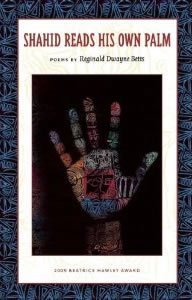Reginald Dwayne Betts: Shahid Reads His Own Palm
“The bridge,” writes Reginald Dwayne Betts, “linking them / to you is a dance / you haven’t mastered, / stories of men who broke nights / into fistfuls of money / & smoke, men / yoked to somebody / else’s dream, maybe” (“Shahid Riffs on Ancestors”). In his debut poetry collection, Shahid Reads His Own Palm, Betts creates for us such a bridge between the reader and the inside of a prison. While all of these poems take place within this landscape, there’s a range of subject matter, emotional appeals, and poetic modes that break the conventionality and monotony that a project like this risks. “Dear Augusta, what do / names mean?” the poet asks. “You / know Universal, Moe-Moe, / Jake—all juveniles when they grilled / the camera for a photo ID, when you / gave them this language / of survival and blood” (“Dear Augusta”). The poems in this collection feel necessary and are unflinching in their often harrowing and perceptive accounts of the prison experience. They are given to us in a single section, without break, which is how I read them, one right after another, and the book has a fittingly claustrophobic feel, bringing to life the “straight lines / & right angles” (“Sometimes It’s Everything”) of a jail.
What separates Betts’s book from others that are strictly organized around a conceit or project is the exchange between the poems and the reader. At once, these poems take us inside the confines of prison and that brutal experience, but at the same time, they reach outwardly from the confines of a jail cell, evoking music and the careful skill of a talented and practiced poet. Take “Two Nightmares” as example:
A man slumps
into the door he can’t open. Every
door is a door to somewhere &
all the strength in his back wants
to get him somewhere else, away
from the clank of a tray slot
signaling chow time.
There’s an authority in Betts’s voice that carries us, and his voice is governed by boldness and consonance. It ranges from the received form of the ghazal, several of which punctuate this manuscript, to a freer flow of language, reminiscent of spoken word poetry, such as heard in “In the Yard, Facing the Fences”: “The banger is speed is omen is weapon is truth is ice pick is sharp is steel is prayer is smoke is there.” It is this other, freer mode that imbues Betts’s poems with life and gives the various figures that appear throughout this book such a compelling voice. The marriage between constraints and silences to the volume of emotional intensity, like prison cells themselves, allows this book to be both honest and skilled: “Imagine this picture: / three gray hairs / on my chin, my hand // reaching into grass / that means nothing” (“The Truth About Four Leaf Clovers” ).
Desire exists in all these poems: desire for transformation, freedom, legacy, as well as a sexuality devoid of eroticism, representing loss, an emptiness that intimacy allows, often merged with violence. In “The Sound of My Mother Crying,” a gun serves as an accessory to a crime, a traitor, and erotic symbol: “You tell your mother that./ Tell her you admitted that the gun was / a kiss & it was so close to the forehead of the sleeping / man that if you were his woman he would have moaned” (“The Sound of My Mother Crying”). In “Saturdays Waited,” a bra strap “reminds / a metal detector / of a knife, or / reminds / a guard / of flesh.” The image of a knife reappears in several poems, representing a means for escape, for power, or as in the following excerpt from “After Midnight,” an implement to scribe and be remembered:
The moon
spits the flat
side of a blade
onto the wall
where the naked
woman hangs
below dinks
that form mistle-
toe & on top
of three words
scratched into
concrete that read
Slim was here.
Betts is a brave poet and Shahid Reads His Own Palm a bold book.
 Reginald Dwayne Betts
Reginald Dwayne Betts